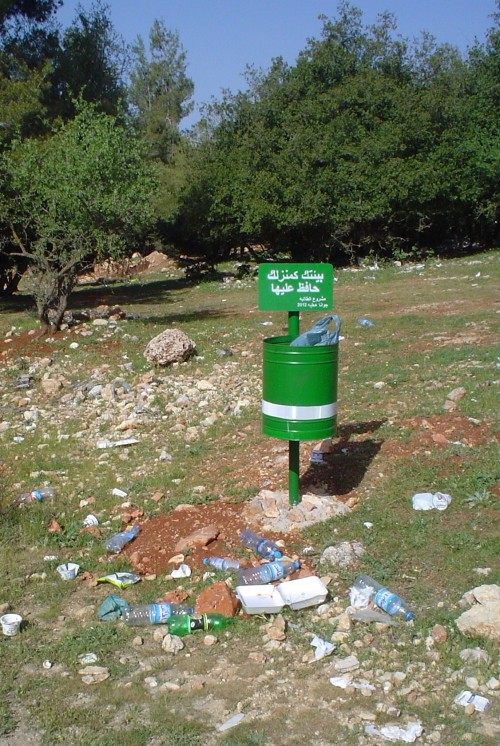24th October 2012
Be proud! Take your rubbish home!
Last week saw a campaign in Amman to clean up the streets. Teams of volunteers brushed and swept to remove tons of rubbish. What a great campaign! But… what about the rest of Jordan?
Visitors always rave about the beauty of the country. And justifiably so: there are amazing places to see and experiences to enjoy. But quite often there is also a sense of disappointment. As one of our guests said this week: “Why can’t they tidy the place up?”

This impression is not good for the tourist trade. Travellers will go home with wonderful memories and impressive photos of Petra, Jerash and the Dead Sea. But they will also recall Wadi Plastic Bottle and Qasr Plastic Bag. This is a shame. And it might prevent them from giving the whole-hearted endorsement of a visit to Jordan to their friends.
The economic impact of this problem is significant. A British businessman, whose company has invested over $10 million in factories in Zarqa told me how distressed he is by the rubbish lining the roads. In a highly competitive market for investment, these impressions affect investment decisions.
We have seen many examples on our own travels around the country. On a trek up Wadi Himara near the Dead Sea last year, we spent the first 100 yards climbing over trash. On a recent visit to Pella we found the roads down to the Jordan valley lined with picnic leftovers and discarded nappies. And walking through the green hills near Ajloun, we found piles of litter surrounding an empty rubbish bin. These experiences are unfortunately not unique.

Of course Britain is far from perfect and I often get cross with the fast-food containers and cigarette ends on the streets of London. But in both Britain and Jordan there are remedies available. And economic advantages from tackling the problem.
Cleaning up the streets is a start, just as we saw last week in Amman. But attitudes also have to be changed to ensure that one week’s clean-up is not replaced by another week’s worth of rubbish. Awareness of the advantages of keeping the environment clean needs to start at school and campaigns can be launched to encourage people not to leave their trash behind.
Everyone has an individual responsibility to be proud of their country and do their bit. Please: take your rubbish home!
Please have a look at this video. I wish I could do the same.
http://www.youtube.com/watch?v=f7bK37uSK0A
I don’t understand how can some people throw rubbish on the floor (angry face).
Thanks Mr Peter for writing about this critical subject. Every time I look at the rubbish around my house or everywhere in Jordan, I wonder WHY. Why nobody takes an action when they see trash accumulation in the garbage container? Is it The Greater Amman Municipality’s responsibility? or people just used to see that and enjoy it! Why is it socially acceptable to throw rubbish everywhere except in the garbage? 🙁
Regards,
Dua’a Al-Domur
Having just returned from a week’s tour of Jordan with the company Explore – we all noted the rubbish problem. However – we also noted that none of the household rubbish bins – or larger wheeled metal ones (present on the roadsides) or bins in tourist areas (which were generally too small) – had any lids. As much of the rubbish we saw was plastic bottles and bags, which would be easily blown in any slight breeze, could it be that at least some of the rubbish problem is due to the lack of lids for bins rather than people carelessly dropping litter? Could investing in lids for bins – or better still – enclosed bins – be a potentially simple and inexpensive way of reducing the litter problem?
When I was at my secondary school the youngest children had the responsibility of seeing that there was no rubbish about the school. They could tell even prefects to pick up litter if they saw them drop it. This worked on two levels : the youngest children were always eager to catch their elders doing wrong and were very vigilant; senior girls did not want to be seen being reprimanded by first year pupils and so were careful not to drop litter. Don’t know how this could be adapted to society generally but perhaps you could give it some thought and make it work!
Well said Peter. The UK has problems but Jordan takes rubbish to another level. Shame because the country and its people have much to be proud of.